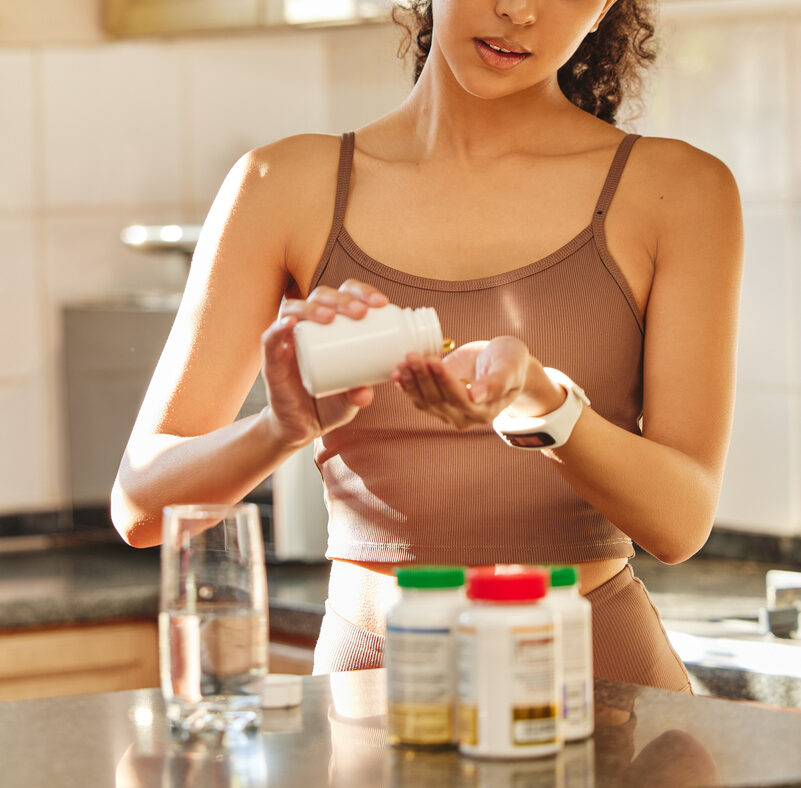When it comes to supplements, the “one-size-fits-all” approach may seem convenient, but it doesn’t always work—especially for women, and particularly for those dealing with hormonal health issues like PCOS (Polycystic Ovary Syndrome). In fact, most popular supplements for both men and women turn out to lean towards catering to the men’s bodies more than the women’s and are hence more harmful than good. We will, in this blog post, discuss why women need to be cautious when consuming generic supplements and give some examples to help guide you in making informed choices about your health.
Women Do Not Get Essential Nutrients: Multivitamins
Most generic multivitamins aim to offer nearly all vitamins and minerals, but very often miss the mark in considering the special needs of women. For example, women, especially those who have PCOS or heavy menstrual cycles, will often require much more iron and folate for good health than men. Unfortunately, many generic multivitamins do not contain enough of these important nutrients.
Why It Matters
Iron: Women lose even more iron during their menstrual cycle and are more at risk for iron deficiency anemia—often made worse when a woman has PCOS, intensifying symptoms like fatigue and hair thinning.
Folate: It should be mentioned at this point that apart from its role in reproductive health, folate helps to control homocysteine levels. This hormone is typically elevated in women with PCOS, which increases the risk of heart problems.
The need for both in a woman is often so great that generic multivitamins often fail, and she remains vulnerable to deficiencies, which would affect hormonal balance negatively.
Protein Powders: A Few Are Not Hormone-Friendly
Protein powders are a fitness staple, but not all protein powders are great for women—especially those dealing with hormonal conditions, like PCOS. Most common protein powders in the market are of soy protein or artificial sweeteners; these can mess up with the hormone levels.
Why It’s Important
Soy protein: While there is definitely a benefit to soy, it is one of the known phytoestrogens, meaning that it imitates estrogen in the body. When women have polycystic ovarian syndrome, excess estrogen can worsen symptoms like irregular periods or acne.
Artificial sweeteners: Sucralose or aspartame contained in may cause insulin resistance in some women, mainly those with PCOS. This can further complicate the control of blood sugar and result in weight gain, already a frequent issue for this group.
Men do not have sensitivity to the ingredients in the same way that females do, which can make generic protein powder quite dangerous for women.
Fat Burners: More Than Just Quick Fixes
Weight loss supplements are big business, but the truth is that fat burners pitched toward both men and women could work contrarily depending on the hormonal profile of your body. Most fat burners contain caffeine and yohimbine or synephrine for boosting metabolism as stimulants. However, they can also cause elevations in cortisol levels—the body’s stress hormone.
Why It Matters
Cortisol: Women are especially sensitive to spikes in cortisol, including those with PCOS or other hormonal imbalances. High cortisol can result in an increase in belly fat; furthermore, it might mess with your menstrual cycle, counteracting any benefits of fat loss.
Stimulant Sensitivity: In that regard, women have been shown to be much more sensitive to the side effects of stimulant-heavy fat-burners, including feelings of anxiety, insomnia, and irregular periods, which can even make them less effective, and potentially harmful.
For men, most of these stimulants just have to work in the system without much ado and do not upset the hormonal balance to a great extent, but for women, it could tend to aggravate things.
Creatine: Works on the Muscle Better, But Possibly Not on Hormones
Creatine is a very popular supplement taken for muscle build-up and athletic performance. Though the supplement is used by both sexes widely, it may not be the best option for women with hormonal problems.
Why It Matters:
Water Retention: Creatine can cause water retention, something that might be difficult for the ladies with PCOS since bloating itself is a frequent symptom.
Hormonal effects: While creatine is generally safe, very little is known about what the effects might be on a woman’s body with androgen-sensitive conditions, such as PCOS. It may exacerbate symptoms related to acne or hair loss due to a slightly increased testosterone level.
Although creatine is a very powerful supplement for men who want to gain mass, females might want to approach taking it with a little bit of caution—especially those with some hormonal imbalances.
Omega-3s: Bad Ratios Can Mess with Hormones
While omega-3s are usually mentioned for the benefits to the heart, the ratio of EPA to DHA in generic supplements might not be something most beneficial for women. Concretely, women with PCOS or conditions that may affect their estrogen levels could particularly need a different ratio to support hormonal balance and heart health.
Why It Matters
Hormonal Balance: Omega-3s help with managing inflammation and balancing hormone levels. Most women with PCOS have inflammatory symptoms because of chronic, low-grade inflammation; thus, to check this, high EPA to DHA ratio supplements should be aimed for.
Heart Health: PCOS women are also at great risk from various cardiovascular problems, which can be supported by the right balance of omega-3s for the heart in ways that generic supplements simply cannot.
Learn More With Veera
While supplements can be of great benefit to health, women, especially those with imbalances and PCOS, have to take supplements that are suited to their individual needs. Generic supplements often ignore the intricate needs of women’s health, and what works for men does not always suffice for women. At Veera Health, their supplements cater to women, taking into account hormonal health—check them out if you want something more personalized for your body.
References:
Iron-Deficiency Anemia among Women: PubMed
Soy Protein Effects on Hormones: The Journal of Nutrition
The effect of fat burners on cortisol and stress level: Obesity Reviews
The Relationship of Omega-3s with Women’s Health: Journal of the American College of Nutrition
Sexually Dimorphic Sensitivity to Stimulant Monoamine Oxidase-A Inhibition


















